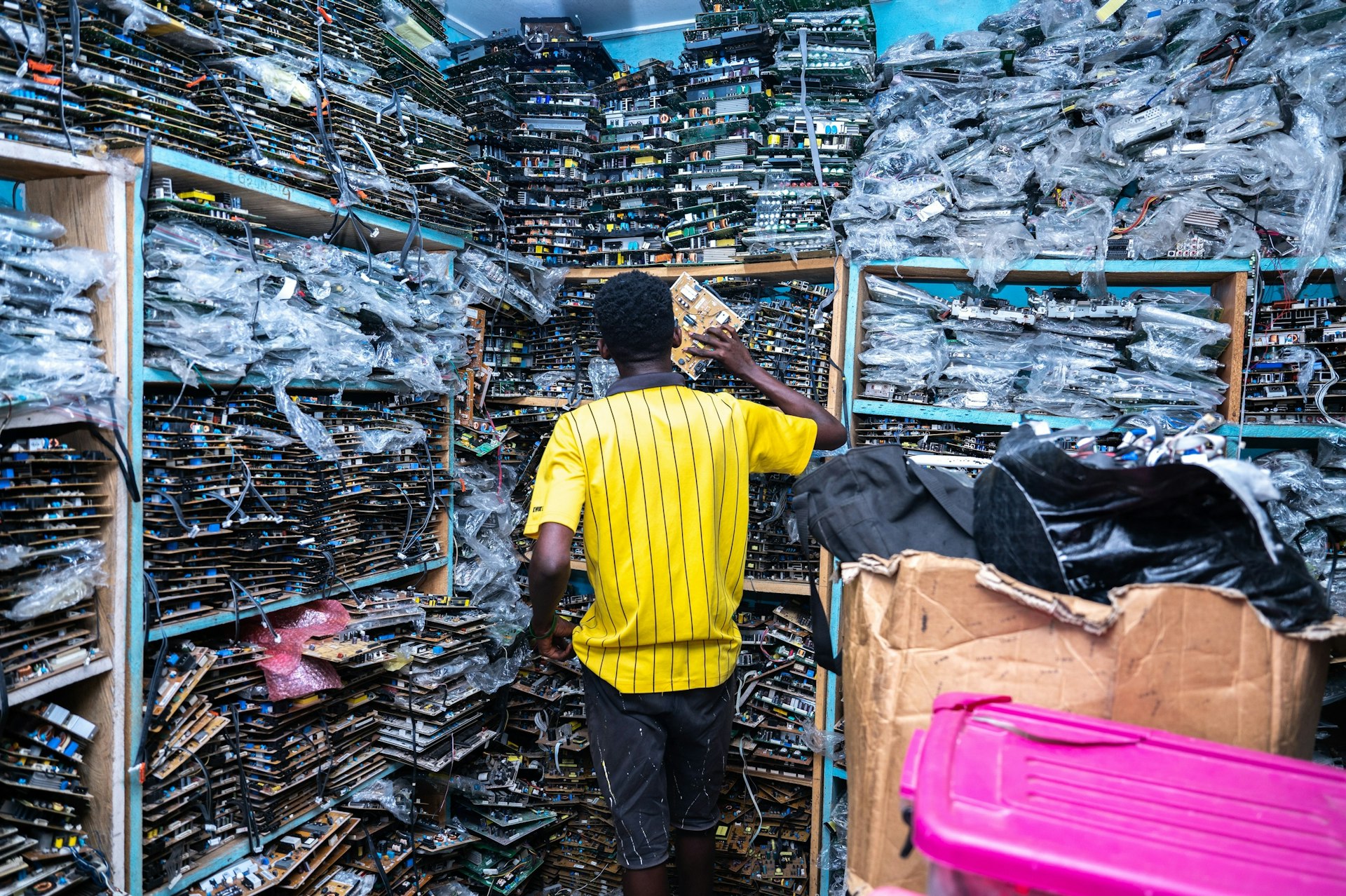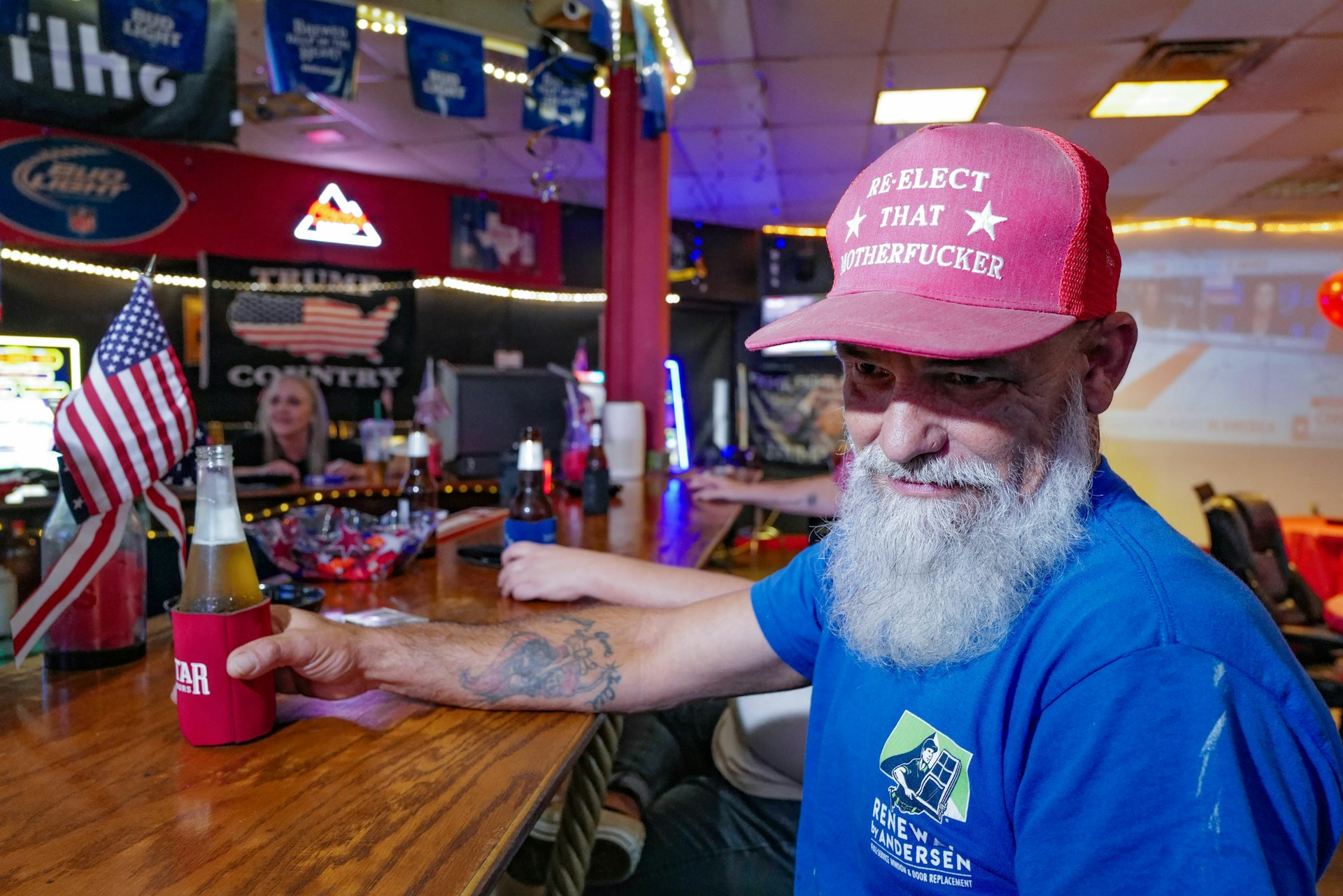In photos: Ghana’s complex e-waste industry
- Text by Isaac Muk
- Photography by Muntaka Chasant, Bénédicte Kurzen

One day in 2023, photographer Muntaka Chasant was in a small village in the northeast of Ghana, walking alongside a local named Maxwell. The pair had first met in the country’s capital, Accra, over 800 km away, while Chasant was documenting the city’s e-waste workers. Maxwell wanted to show the photographer his hometown away from the big city and introduce him to the local community.
“The Upper East [region] is one of the most climate impacted areas of Ghana, and the main source of livelihood is rain-fed agriculture,” Chasant explains. “Now, you’re lucky to get two or three months of rain a year, and for the rest of the year they have nothing to do, so many people are forced to migrate southwards.”
As the pair walked down the village street, local people stopped to greet Maxwell, bowing down before him as a mark of respect. Having seen Maxwell in his place of usual work, where he burned old electrical wires to extract tiny fragments of copper, the reverence caught Chasant by surprise. “Maxwell has built a new house for his family from the burning of waste cables in Accra,” he continues. “He is seen as a very important member of the society because he managed to build a home, buy fertiliser and support agriculture in his community, but many of them don’t actually know that the kind of work Maxwell is engaging with back in Accra is actually hazardous to himself and others.”


By moving to Accra for large portions of the year and working in its huge e-waste recycling industry, Maxwell had found a way to become upwardly mobile both socially and economically. He features in a new joint exhibition, Ghana: Following our e-waste, which is currently on show at the Foundation Manuel Rivera-Ortiz in Arles, France. Presented by the Fondation Carmignac at the MRO Foundation, it combines Chasant’s photographs with those of fellow photographer Bénédicte Kurzen, alongside reporting from investigative journalist Anas Aremayaw Anas, whose work highlights corruption in the industry, and opaque, illicit flows of waste in and out of Accra’s ports. As laureates of the Carmignac Photojournalism Award, Kurzen, Chasant, and Anas produced their report with the support of the award.
Their work serves as a window into the country’s massive, unregulated industry, and its social, environmental and economic complexities. Chasant’s photographs focus on workers in the e-waste industry, while Kurzen’s work follows the journey that the waste takes as it flows from Europe through various towns and communities before reaching Ghana. Each year, Ghana imports around 150,000 tonnes of e-waste into the country, mostly from discarded-yet-functioning electronics from the USA and Europe, which is then either repaired or recycled for parts and materials.



“E-waste is an umbrella term for two main things, one is what we call UEEE – used electronical and electronic equipment – those are functional and work alright. The second is WEEE – waste electronic equipment that is non-functional and non-repairable,” Chasant explains. “There’s a large market for functional e-waste in Ghana. Its GDP per capita is around $2,500 USD, so not a lot of people can buy brand new laptops, washing machines and iPhones – such e-waste provides upwards social mobility because it’s the only way people can get online. Then there is also the informal recycling sector, which uses crude methods to extract valuable materials from end-of-life e-waste.”
The exhibition challenges narratives surrounding the country’s e-waste industry, which was the starting point for Chasant, Kurzen and Anas. Within the media, reporting has focused on the huge volumes of waste imported into the country, while oversimplifying the phenomenon simply as a ‘problem’. “For more than a decade, informal e-waste recycling in Ghana has spawned documentaries, essays and academic studies in the world’s media outlets,” Chasant says. “But narratives of mass e-waste dumping were dominating the conversation, and something that was missing was local knowledge – our first goal was to dismantle some of these narratives that were constructed in the Western press, and this parachute journalism that has had significant impacts on these communities.”
It highlights the opportunity that the sector can bring to people like Maxwell, but also its costs – material extraction can come from simply burning e-waste, which releases huge amounts of pollution into the atmosphere, while also making for dangerous work as e-waste workers extract materials by DIY, often dangerous means. The solution then, according to Chasant, is simple: build formal recycling centres with regulated health and safety protocols, while providing people with employment.
Yet those calls have fallen on deaf ears, particularly within the government. “We have been having this conversation for over a decade and it has not happened, and that is mainly because of the way that the conversation has been constructed from the beginning,” he adds. Chasant claims the government have tended to ignore problems, rather than try to engage constructively. “In 2021, the government showed up with armed military and bulldozers and dismantled the infamous [e-waste recycling site] Al Balushi scrapyard. But now, we instead have multiple sites resembling it.
“I have been doing this for more than a decade,” he continues. “And the truth is that people prefer to hear the black-and-white side of things, not these complexities and nuances.”
Ghana: Following our e-waste is on view at Foundation Manuel Rivera-Ortiz (MRO), Arles, France until September 28
Buy your copy of Huck 81 here
Enjoyed this article? Follow Huck on Instagram
Support stories like this by becoming a member of Club Huck
Latest on Huck

Picking through the rubble: Glimpses of hope in the US election results
Clambering through the wreckage of the Harris campaign, delving deeper into the election results and building on the networks that already exist, all hope is not gone writes Ben Smoke.
Written by: Ben Smoke

US Election night 2024 in Texas
Photographer Tom “TBow” Bowden travelled to Republican and Democratic watch parties around Houston, capturing their contrasting energies as results began to flow in.
Written by: Isaac Muk

In photos: “Real life is not black and white” – Polaroid x Magnum Open Call winners
See pictures from the competition organised by two titans of contemporary photography, which called upon artists to reject the digitalisation and over-perfectionism of our modern world, technology and image-making.
Written by: Huck

In photos: Rednecks with Paychecks
‘American Diesel’ is a new photo series that looks at the people, places and culture behind the stereotypes of rural America.
Written by: Ben Smoke

How do you solve a problem like the music industry?
Beyond the Music is a conference and grassroots festival bringing together people from across the industry to try and grapple with the biggest issues facing it.
Written by: Ben Smoke

Laura Crane is waving goodbye to sexism in surfing
The first UK woman to surf the legendary big wave spot Nazarè, Crane is surfing the sea change in the sport and beyond.
Written by: Sam Haddad










